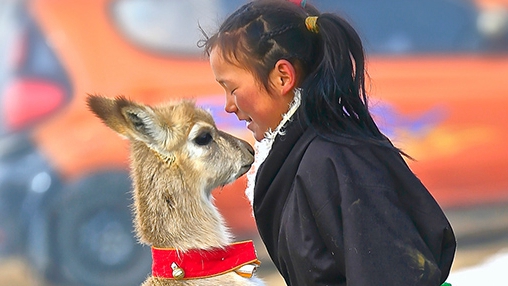Ancient village in Xinjiang embraces new vitality in cultural tourism
At dusk in Yueliangdi village, cooking smoke rose high from several houses with greyish blue tiles and yellow walls, diffusing a scent of freshly cooked food. In the yards surrounding the houses, vegetables were growing prosperously. A few elderly villagers played traditional Chinese music instruments, attracting a number of tourists.

Photo shows Yueliangdi village in Mori Kazakh autonomous county, Changji Hui autonomous prefecture, northwest China's Xinjiang Uygur autonomous region. (Photo from the official website of the National Development and Reform Commission)
Yueliangdi village sits in Mori Kazakh autonomous county, Changji Hui autonomous prefecture, northwest China's Xinjiang Uygur autonomous region. It boasts a history of over 100 years.
Today, it has been developed into a hot tourist destination with traditional local residences, folk customs, handicrafts and natural scenery. It is one of the best-preserved ancient villages in Mori Kazakh autonomous county.
In 2014, Yueliangdi was selected as one of the third batch of traditional Chinese villages, a title jointly given by seven ministries. Ever since, the village has become a hotspot tourism destination, receiving numerous visitors all year round.
Folk houses are an important part constituting the picturesque view of Yueliangdi village. Today, house groups built over a century ago are still well preserved in the village. The houses are constructed with all wooden frameworks, and have wide porch eaves to keep rainwater from infiltrating the walls and windows.
In recent years, the village has made constant efforts to maintain the original appearance of the folk houses while improving its living environment. A characteristic tourist attraction with profound agricultural culture has been built.

Photo shows Yueliangdi village in Mori Kazakh autonomous county, Changji Hui autonomous prefecture, northwest China's Xinjiang Uygur autonomous region. (Photo from the official website of the National Development and Reform Commission)
Since 2016, the local government has invested 30 million yuan ($4.42 million) in upgrading folk houses, enhancing the road network and internet infrastructure, renovating ancient stages of traditional operas, and building the village archive and an agricultural museum.
Enjoying rich water resources and fertile soil, the village boasts a profound agricultural culture. In the village, tourists can not only take a close look at local folk houses, but also watch the production of handmade vinegar and other local techniques. On holidays, they can also experience local customs activities such as wedding ceremonies.
The local agricultural museum introduces to tourists the whole development of the agricultural culture in the village. Traditional Chinese opera and folk songs in Xinjiang are always presented on the ancient stages.
Wang Shuqin is an octogenarian in the village who has been making handmade vinegar for nearly five decades. Her handmade vinegar was taken from wheat, highland barley, sorghum, black beans and other natural ingredients after a month of process.
However, the market for the handmade product, which has been passed on for generations in Wang's family, once shrank significantly due to the industrialized production of vinegar.
A few years ago, the village upgraded the vinegar workshop and invited Wang to instruct women in the village to make vinegar. Thanks to the prospering local tourism, the well-known vinegar workshop has brought many tourists to the village.

Photo shows a cultural activity held in Yueliangdi village in Mori Kazakh autonomous county, Changji Hui autonomous prefecture, northwest China's Xinjiang Uygur autonomous region in 2021. (Photo from the official website of Mori Kazakh autonomous county)
At present, a number of handicrafts in the village are re-emerging, such as tiger-head shoes, embroidered slippers and handmade dried noodles. They have not only carried forward traditional skills, but also improved the income of villagers. Now, apart from tasting local dishes in Yueliangdi village's folk houses, tourists can also cook food together with local villagers.
Today's Yueliangdi village is home to over 30 agritainment facilities and B&Bs with unified standards. Hu Jian'gang, who started a B&B a few years ago, told People's Daily that the B&Bs in the village all maintain the original appearance of the local folk houses, and they are equipped with flush toilets, showers and standard kitchens. Every agritainment facility is booked full on holidays, the man said.
Photos
Related Stories
- Great beauty of Xinjiang Aksu's intangible cultural heritage: The Art of Uyghur kalong making
- Arduous battle against tuberculosis bears fruit in Xinjiang
- How farmers harvest tomatoes in Xinjiang
- Xinjiang advances construction of rural drainage pipe networks
- Xinjiang embraces red chili pepper harvest
- Business owner makes better life selling nang in Xinjiang
- Photo story: A paragliding amateur aims to discover more beauty of Xinjiang
- Tomato enters harvest season in Xinjiang
- In pics: Beautiful Korla of NW China's Xinjiang in summertime
- Diplomats from 30 Islamic countries visit Xinjiang
Copyright © 2022 People's Daily Online. All Rights Reserved.









